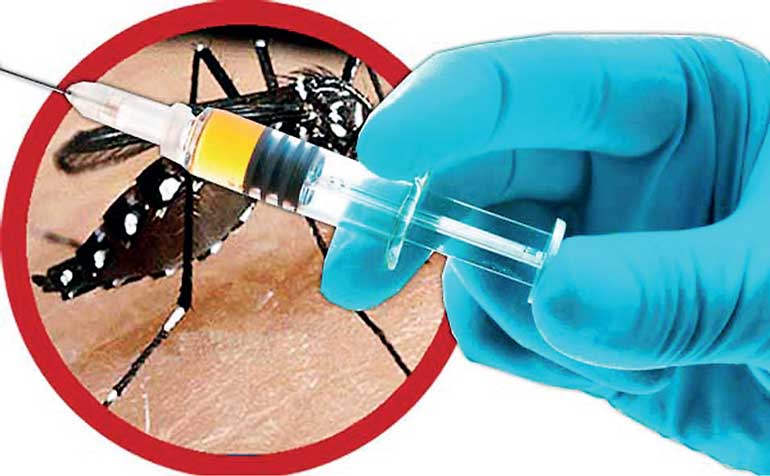Monday Feb 23, 2026
Monday Feb 23, 2026
Friday, 18 August 2017 00:00 - - {{hitsCtrl.values.hits}}
 By Fathima Riznaz Hafi
By Fathima Riznaz Hafi
The introduction of the world’s first dengue vaccine ‘Dengvaxia’, which was developed by French pharmaceutical giant Sanofi-Pasteur, and the subsequent approval for its use in neighbouring Singapore, sparked hope here in epidemic-hit Sri Lanka where rising numbers have left people in desperate need of a solution.
Locals are raising questions as to why the vaccine has not been approved here yet. Meanwhile, affluent Sri Lankans are flying to Singapore to grab the opportunity.
Singapore’s Parkway Hospital is one of the centres which provides the vaccine and Sri Lankans who wish to travel to Singapore to receive the vaccine can get the necessary guidance from local representative the Parkway Patient Assistant Centre, whose hotline has been busy attending to anxious callers. However, the local office advises the public that though the vaccine carries immense benefits, they should gather the necessary information, understanding the pros and cons before taking the step. They will thereby be able to make a more informed decision.
People are going there without proper knowledge of the vaccine, they said. Some are under the impression that it offers life-long immunity and that it only needs to be administered once. Parkway Patient Assistant Centre clarifies that this vaccine cannot be taken in one trip – the person needs to receive three doses in six-month intervals. After the initial dose, the second dose is given in the sixth month while the final dose will be delivered during the 12th month. After the third dose they have immunity up to four years. The process then has to be repeated.
The safety profile of the vaccine is generally consistent with that expected of a vaccine. As with all vaccines, it can cause side effects, most of which are minor (sore arm, low-grade fever, etc.) and they usually go away within a few days.
Dengvaxia was approved by Singapore’s Health Sciences Authority (HSA) last year, for the prevention of dengue infection caused by dengue virus serotypes 1, 2, 3 and 4 in individuals aged 12-45 years. According to their studies, the vaccine was found to be less effective against DENV-1 and DENV-2. The vaccine efficacy was 50% for DENV-1 and 40% for DENV-2 versus 75% for DENV-3 and 77% for DENV-4 infection.
The vaccine provides significantly better protection to those who have had prior exposure to dengue, as compared to those without previous dengue infection (i.e. 81% against 38% protection respectively against all four strains). The vaccine is therefore less likely to benefit those who have not previously had dengue.
Since the vaccine is more effective in those who had a previous dengue infection, and there is a postulated risk of severe dengue in those who do not have past dengue infections when they become infected subsequently, HSA recommends that individuals interested in getting the vaccine consult their doctors on the benefits and risks of the vaccination. Doctors may consider a blood test, when available, to determine their past infection status. This may provide additional information to enable the individual to make an informed decision on the benefits versus the risks of the vaccination.
Further information and details can be obtained from the Parkway Patient Assistant Centre, Nugegoda by calling 0773460000/0112809000 or by emailing [email protected].